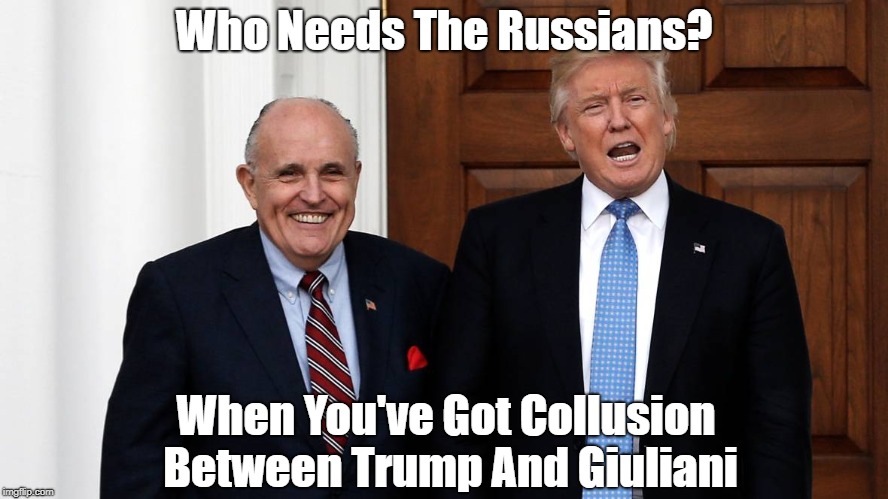
Giuliani’s Other Big Admission May Be Even Worse For Trump
You know it’s gotten bad when the president is required to do damage control for his lawyer, but that’s exactly what happened this morning, when Donald Trump took to Twitter to explain himself, after Rudolph W. Giuliani admitted on Fox News that Trump repaid $130,000 in hush money to Stormy Daniels. In suspiciously non-capitalized prose, Trump (or his ghost-tweeter) basically confirmed the story and said it was no biggie.
But Giuliani’s other admission — delivered during his interview with Sean Hannity on Wednesday night — may be more important and damning. Giuliani conceded in an offhand way that Trump fired FBI Director James B. Comey because Comey failed to do Trump’s bidding and publicly declare that Trump was not under investigation. Here’s what Giuliani said:
“He fired Comey because Comey would not, among other things, say that he wasn’t a target of the investigation,” Giuliani said. “He’s entitled to that. Hillary Clinton got that, and he couldn’t get that. So he fired him, and he said, ‘I’m free of this guy.'”
In saying this, Giuliani appears to have thought that he was exonerating Trump. Giuliani was saying Trump didn’t fire Comey to obstruct the investigation into Trump campaign collusion with Russian sabotage of our election, but rather because Comey didn’t publicly clear him, which Giuliani believes Trump was “entitled to.”
But this undercuts the leading public rationale that Trump offered for firing Comey. The White House has cited Comey’s handling of the Hillary Clinton email investigation as the fake pretext for the firing. But now Trump’s own lawyer has confirmed on national television that the rationale was directly related to the Russia investigation.
“It seems that Giuliani is trying to suggest that Trump did not obstruct justice when he fired Comey,” Barbara McQuade, a former prosecutor and current law professor at the University of Michigan, told me. “But in fact he may just be building the case against him. Even demanding that Comey make a public statement that Trump is not under investigation would itself potentially be obstruction of justice.” McQuade added that insisting on such a public statement constitutes “interfering in the investigation.”
Here’s a key bit of context showing why Giuliani’s admission could be important: Remember that Trump himself reportedly made this same demand of Comey — and that special counsel Robert S. Mueller III appears to be examining that demand as part of his effort to determine whether Trump obstructed justice.
After Comey publicly confirmed the existence of the probe in March of 2017, Trump told Comey in a March 30 phone call that he wanted Comey to confirm he was not personally under investigation, to publicly “lift the cloud” that the probe had cast over his presidency, according to Comey’s memos. Comey detailed in the memos that he didn’t want to do this, because the status of the probe could change (as it ultimately did), and he wanted to avoid having to publicly confirm such a change later. Comey took this exchange seriously enough to report it to his superiors at the Justice Department.
What’s more, we know that a short time later, Trump personally asked two other top intelligence officials to publicly confirm what Comey would not. As The Post reported, they both refused the request, which they deemed “inappropriate.” Trump subsequently went further, prodding them to directly intervene with Comey to curtail the investigation, which they also refused to do.
We also know that Mueller is looking at all of this conduct. To establish obstruction, Mueller needs to show that in trying to hamstring or derail the probe, Trump acted with “corrupt intent,” say, to protect himself and his top officials from scrutiny. The leaked questions from Mueller show that he wants to ask Trump about that very same March 30 call with Comey in which he seems to have demanded that Comey publicly exonerate him. Mueller wants to probe Trump’s state of mind about all of this, including whether Comey’s public confirmation of the investigation — which angered Trump — helped precipitate Comey’s firing.
Giuliani has now publicly confirmed that all that did indeed figure into Trump’s rationale. And Mueller’s team may take an interest in this, McQuade told me: “This will cause them to review what they’ve done already and will inform their questions going forward.”
To be clear, it still remains very unlikely that Mueller will try to indict Trump for obstruction of justice. But Mueller is expected to produce a report on the obstruction question, and his findings on it may be made public in some form. Whether or not Trump can be held criminally liable for obstruction, Mueller may end up documenting a pattern of very serious misconduct, which could shed new light on just how far Trump went to shield himself and his cronies from accountability, something that could have serious implications for our politics and for our efforts to restore the integrity of the rule of law amid Trump’s nonstop degradation of it.
Giuliani has inadvertently lent more salience to this whole line of inquiry.
No comments:
Post a Comment